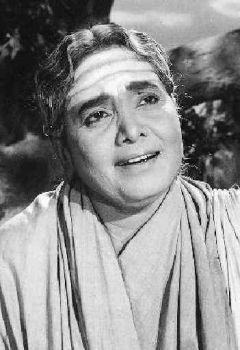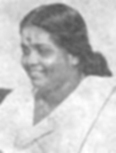One
Hundred Tamils
of the 20th Century
K. B. Sundarambal 1
 Kodumadi
Balambal Sundarambal (1908-1980) was a
renowned stage artist and singer of South
India. She was popularly referred to as the
"Queen of the Indian stage.". She was noted
both for her resonant, vibrant voice and
for the dignity of her performances. A
political activist during the Indian
independence movement, K.B. Sundarambal was
the first film personality to enter a state
legislature in India.
Kodumadi
Balambal Sundarambal (1908-1980) was a
renowned stage artist and singer of South
India. She was popularly referred to as the
"Queen of the Indian stage.". She was noted
both for her resonant, vibrant voice and
for the dignity of her performances. A
political activist during the Indian
independence movement, K.B. Sundarambal was
the first film personality to enter a state
legislature in India.
Early years
K.B. Sundarambal was born on October 11, 1908 in the village of Kodumudi (also spelled "Kodumadi"), on the banks of the Kaveri, about 35 km from the town of Erode in present-day Tamil Nadu. Little is known of Sundarambal's father; her mother, Balambal, barely managed to eke out a living. Indeed, so penurious was the family that Sundarambal, as a child, is said to have made some much-needed money by singing ditties on trains and receiving tips from the passengers.
Stage debut
Such was Sundarambal's training in music. According to some sources, it was while singing thus on a train that the 10-year-old Sundarambal attracted the attention of Natesa Iyer, an amateur stage actor, producer and talent-scout. According to other sources it was a police official named Krishnaswamy Iyer, an acquaintance of Balambal, who discovered the talent in Sundarambal and introduced the 10-year-old girl to P. S. Velu Nair, one of the reigning dramatists of that era.
In either case, Sundarambal is believed to have made her debut in 1917, on the Tamil stage, as a member of a travelling theatre troupe. This was the turning point in her life. The talented young girl honed her voice while performing small roles on stage and keeping audiences entertained between acts. Soon enough, she was essaying leading roles on stage. Her early stage plays like "Valli Thirumanam," "Pavalakodi" and "Harishchandra" proved to be great hits. In particular, "Valli Thirumanam", where she co-starred with S.G. Kittappa, was a phenomenal success.
Marriage
While working together in the theatre, Sundarambal and S.G. Kittappa fell in love. They were married in 1927. For the next few years, Sundarambal lived a life that was both personally and professionally satisfying. The couple became cult figures with theatre aficionados. Unfortunately, the phase came to a sudden end with the untimely death of S.G. Kittappa in 1932. Sundarambal left the stage sometime after this happened, preferring to pursue a career as a concert artiste.
Filmography
A celebrated theatre personality and an accomplished concert artiste, Sundarambal was to find success in films as well. Although she accepted only a few film offers, they have proved to be landmarks. Her performance as Avvaiyyar, the Tamil poet-saint, was so convincing that she has become almost synonymous with the legendary personality. "Nandanar" and "Avvaiyar," in both of which she played Avvaiyar, were runaway hits. Her other great successes were in "Manimekhalai," "Thiruvilayadal," "Karaikal Ammaiyar" and "Kandan Karunai." Singularly lacking in oomph, Sundarambal's golden voice and the devotional fervour of her singing was what set the box offices afire.
Political activism
Sundarambal and her husband S.G. Kittappa had been much affected by the Indian independence movement and had became ardent supporters of the Indian National Congress. They had harnessed their popularity and talents to further that cause. Sundarambal continued to champion the movement, recording several gramophone discs extolling the struggle and sacrifices it entailed. She also made it a point to always wear khadi. She often actively campaigned in support of Congress part candidates at various elections. After India gained independence, K.B. Sundarambal entered the Legislative Council of Madras State in 1951 as a Congress nominee, the first film artist to enter an Indian legislature.
Honours
In 1964, the Tamil Isai Sangam conferred upon her the title of "Tamil Isai Perarignar." In 1970, the government of India awarded her the Padmashri for her contributions to the arts. K.B. Sundarambal, artiste extraordinaire, died in October 1980.
Further reading
- Kodumudi Kokilam K.B. Sundarambal Varalaru. Biography in Tamil by P. Chozhanadan. Published by Rishabham Pathippagam, K.K. Nagar, Chennai 600 078.



